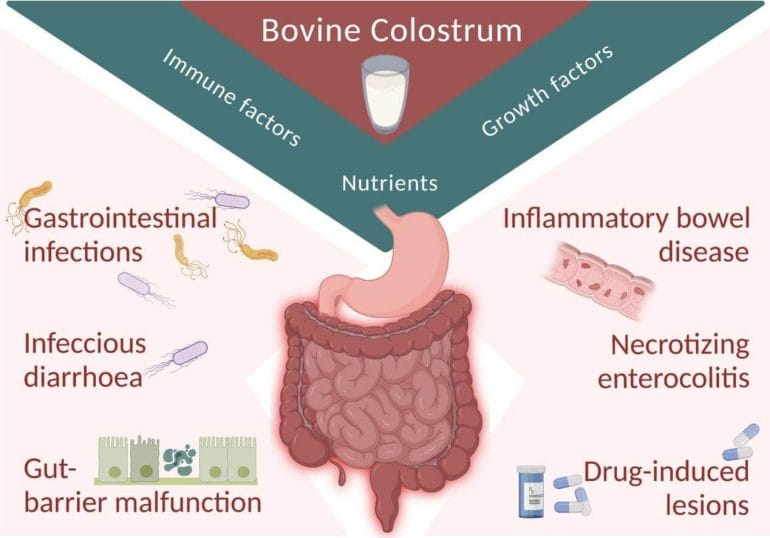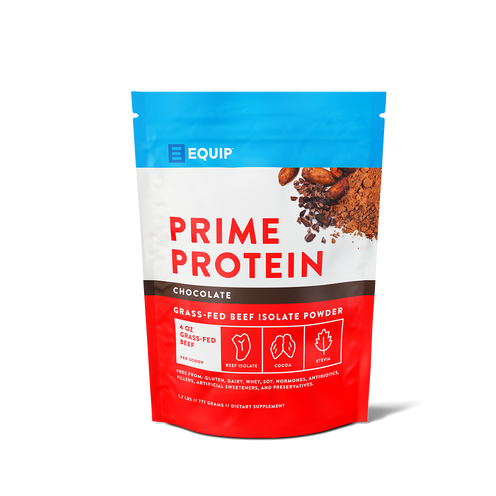Credit to our friend Michael Kummer for this post! Here is the original article.
Background
Colostrum (also known as “first milk”) is the milk that mammals produce right before giving birth. It’s important for newborns to consume colostrum because the substance is packed with the mother’s antibodies, insulin-like growth factors, bioactive enzymes, fat and other vital nutrients that don’t exist in regular milk.
In other words, colostrum acts like an immunization for newborns.
What I wasn’t aware of until recently is the fact that colostrum is also available as a dietary supplement (albeit from cows and not humans), and that there are purported benefits associated with bovine colostrum supplementation, even among adults.
Why Colostrum Is Important for Newborns
Colostrum has so many scientifically-proven health benefits that doctors even give it to babies who are born prematurely and unable to nurse.
When our son Lucas was born nine weeks before his due date, my wife used a pump to extract colostrum, which our doctors fed to him via a stomach tube.
In addition to the antibodies and immunoglobulins in colostrum, it also serves as a vital source of protein, carbohydrates (lactose), fat and fluids for newborns.
Note that the lactose in colostrum and human milk doesn’t usually cause digestive issues for breastfed babies because they also make a sufficient amount of lactase, the enzyme that helps break down lactose into glucose and galactose.
As a result, there’s zero doubt within the scientific community that colostrum has significant health benefits for newborns, and that its absence can lead to several health issues later in life, including compromised immune systems.
Human Colostrum vs. Bovine Colostrum

Human colostrum is crucial for the development of newborns. But if human colostrum isn’t available, can bovine colostrum be used instead?
Before I try to answer that question, let’s talk about the major differences between human and bovine colostrum.
Bovine colostrum contains less lactose (milk sugar) but higher amounts of the milk protein casein than human colostrum. The latter helps the development of the calf’s muscle tissue. That’s important because calves, like most mammals in the animal kingdom, need to be on their feet shortly after birth in case they have to run away from predators.
Human babies are immobile and dependent on their parents for many months, but their brains develop rapidly during the first few months of life and thus benefit from the glucose in colostrum and breast milk as a form of fuel.
Additionally, there are significant differences in the makeup of the antibodies (immunoglobulins) contained in human and bovine colostrum.
For example, human colostrum doesn’t contain significant amounts of immunoglobulin G (IgG) antibodies to protect against bacterial and viral infections. That’s because the mother passes those to the fetus via the placenta.
As a result, the primary antibody in human colostrum is immunoglobulin A (IgA), which is important for, among other things, protecting the intestinal lining (epithelial cells) of the gut.
On the flip side, calves are born with no immune system and rely solely on colostrum for all the (IgG) antibodies necessary to fight infection and inflammation.
Despite those differences, there is sufficient scientific evidence to suggest that supplementing with bovine colostrum has health benefits for humans.
Benefits of Bovine Colostrum

Bovine colostrum is highly nutritious and contains significantly more nutrients than both transitional and mature milk.
Specifically, bovine colostrum has a more advantageous composition of both macronutrients (protein, fat and carbs) – and certain micronutrients (B vitamins, vitamin A, C and E, and magnesium) than regular cow’s milk.
However, it’s not the additional vitamins and minerals, but the proteins — including hormones, enzymes and antibodies — that provide the health benefits of bovine colostrum. The four most beneficial proteins in bovine colostrum are:
-
Lactoferrin
-
Growth factors
-
Immunoglobulins
-
Lysozyme
Lactoferrin
Lactoferrin helps with the absorption of iron (“ferrum” means iron in Latin) in the intestine and the delivery of this important mineral into cells. Some studies suggest that lactoferrin acts as a protective agent against bacterial, viral or fungal infection, and may help balance the immune system.
Additionally, lactoferrin displays important antioxidant, antimicrobial and immunomodulatory activities.
While scientists understand the general role of lactoferrin in the human body, more research is needed to identify the exact benefits of lactoferrin supplementation.

Bovine colostrum contains about 50 growth factors (polypeptides) including epidermal growth factor (EGF), betacellulin (BTC), insulin-like growth factors, fibroblast growth factor 1 and 2 (FGF1 and FGF2) and platelet-derived growth factor (PDGF). All of those factors have a positive impact on cell growth and repair.
For example, insulin-like growth factors, including IGF-1 and IGF-2, can help stimulate the regeneration and proliferation of cells in the gut lining (epithelium).
Studies have shown that growth factors derived from bovine colostrum can turn on genes that promote the growth and regeneration of intestinal epithelial cells.
Considering the fact that the lining of the gut — which prevents pathogens from reaching your bloodstream — is only five to seven cells thick, it’s incredibly important to do everything you can to strengthen that barrier.
In fact, a compromised lining of the gut (also known as “leaky gut”) is one of the key drivers of metabolic disease, and the reason why I do everything I can do support the health of my gut and its microbes.
While your overall lifestyle and dietary habits play a major role in gut health, supplementing with colostrum could be another effective tool you can leverage.
Immunoglobulins
Immunoglobulins are antibodies that help your body fight bacteria, viruses and other pathogens. Studies have shown that supplementing with bovine immunoglobulins (from colostrum) may be helpful “to support immune function in vulnerable groups such as infants, children, elderly and immunocompromised patients.”
In other words, if you have a strong immune system, supplementing with colostrum might not offer you additional protection. But if you don’t, it’s worth considering.
If you fall into one of the higher-risk groups, I highly recommend making changes to your lifestyle, and that you even consider taking supplements to help support your immune system.
Much like immunoglobulins, colostrum peptides can modulate the immune response of intestinal epithelial cells. In other words, certain building blocks of the protein found in colostrum can further help boost your immune system.
Lysozyme
Lysozyme is an antimicrobial enzyme that’s found in high concentrations in colostrum. One of its benefits is that it hydrolyses (breaks down) the cell walls of bacteria, thus rendering them ineffective.
Benefits of Bovine Colostrum Supplementation
Any time I consider ingesting a compound that’s foreign to the human body — regardless of whether it’s a plant-based, animal-based or a synthetic compound — I ask myself two questions:
What are the potential benefits?
What are the potential side effects?
As far as bovine colostrum is concerned, I haven’t seen any scientific evidence showing negative side effects of supplementation in healthy adults or children.
However, if you suffer from lactose intolerance, you might experience GI upset after consuming bovine colostrum because of the residual amounts of lactose some supplements contain.
On the flip side, I’ve seen several studies indicating that supplementing with bovine colostrum can help with upper airway infections, gastrointestinal disorders (e.g., infectious diarrhea), the flu, athletic performance and more.
So let’s dive into the purported health benefits in some of the areas that I consider most relevant.
Influenza (Flu) Prevention
Based on an epidemiologic (observational) study from 2007, supplementing for eight weeks with orally-administered colostrum reduced the incidence of complications and hospital admissions (related to the flu) by 300%, even among people who received the influenza vaccination.
While observational studies (as opposed to clinical trials) have inherent problems and often can’t prove causation (only correlation), the potential benefits of supplementing with colostrum clearly outweigh the low risk of potential side effects.
So if you’re elderly or immunocompromised, and getting the flu would likely increase your risk of hospitalization or severe complications, you might want to consider supplementing with colostrum during the flu season.
Gastrointestinal Disorders and Immune Function
A study performed on children and immunocompromised adults (e.g., people with HIV infections) indicated that supplementing with bovine colostrum can prevent gastrointestinal tract infections (such as those caused by escherichia coli) or reduce their impact (i.e., prevent diarrhea).
The study’s authors concluded that, “the administration of passive immunity in the form of bovine immunoglobulins can be protective against a range of pathogens and is especially effective in immunocompromised individuals.”
In other words, colostrum has anti-inflammatory and antimicrobial properties that offer beneficial effects against pathogens.
As I mentioned above, given the low risk of potential side effects, I’d seriously consider supplementing with colostrum if you suspect that your immune system isn’t functioning properly due to intestinal permeability (leaky gut), a disturbed gut microbiome, or other causes.
Exercise Performance
Considering my relatively healthy lifestyle and everything I do to support my immune system, I don’t spend a lot of time thinking about supplements (with some exceptions, including beef organs and beef liver supplements and exogenous ketone supplements). However, what piqued my interest in colostrum was its potential to improve my athletic performance and recovery.
In a double-blind, randomized, placebo-controlled study conducted with soccer players, scientists concluded that supplementing for six weeks with low-dose bovine colostrum resulted in faster recovery and a better ability to maintain athletic performance.
Additionally, there is mounting evidence that supplementing with bovine colostrum “is beneficial for certain groups of athletes, such as those involved in strenuous training (e.g. endurance athletes), in terms of immunity and resistance to infection.”
That’s pretty cool, and perhaps reason enough to enjoy using our colostrum supplement — even if you’re only a serious fitness enthusiast (like I am) and not a professional athlete.
Note from Equip: Our Core Colostrum is grass-fed and finished, sourced from small farms across the U.S. and contains just one ingredient: bovine colostrum! It is the perfect addition to a shake with our beef protein powder and collagen powder. It can also be added to coffee, yogurt, oatmeal, or just taken on its own! Click here to check it out.


